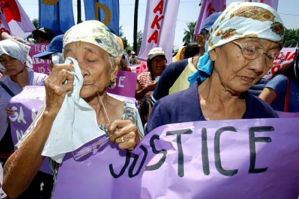
A prominent conservative-leaning newspaper in Japan has issued an apology in print Friday for using the term "sex slaves" in its English-language publication to describe Asian women forced into brothels run by the Japanese military during World War II.
According to the apology issued by The Japan News, the English-language edition of The Yomiuri Shimbum that used to be called The Daily Yomiuri, or DY, the "sex slave" term was used in a total of 97 articles from February 1992 to January 2013 while reporting on the issue of comfort women. The paper claims that such terms were used in an "inappropriate manner."
"The expression 'comfort women' was difficult to understand for non-Japanese who did not have knowledge of the subject," the paper wrote in its apology. "Therefore the DY, based on an inaccurate perception and using foreign news agencies' reports as reference, added such explanations as 'women who were forced into sexual slavery' that did not appear in The Yomiuri Shimbun's original stories.
The Japanese paper added through its apology that it initially accurately presented a 1993 statement from Chief Cabinet Secretary Yohei Kono, which stated that ".... at times, administrative/military personnel directly took part in the recruitments [of comfort women]." However, the paper also admits that they simplified his statement to "The government admitted that the Imperial Japanese Army forcibly recruited women," implying that the coercion by the government was an "objective fact."
According to the Associated Press, a Japanese government investigation conducted in the 1990s concluded that many women "were recruited against their will" and "lived in misery at comfort stations under a coercive atmosphere." Both statements appeared in Kono's 1993 statement.
Japanese Prime Minister Shinzo Abe and other right-wing lawmakers and activists in Japan have maintained that the women working in the brothels back in WWII were not forced into prostitution and therefore could not be accurately called "sex slaves." His position on the "comfort women" issue, along with his ambitious goal of revising or retracting the Kono statement altogether, has angered and soured relations with South Korea, China, the Philippines, and other Asian countries occupied by Japan during the war, sparking protests throughout the region.
The original story that brought the comfort women issue to worldwide attention came from an article written by journalist Takashi Uemura for The Asahi Shimbum, who told the story about a former "comfort woman" from Korea. However, Martin Fackler of the New York Times noted that Uemura has paid a heavy price in his home country for writing that article, making him a target of the Japanese political right.
"Tabloids brand him a traitor for disseminating 'Korean lies,'" Fackler wrote. "Threats of violence, he says, have cost him one university teaching job, and could soon rob him of a second. Ultranationalists have even gone after his children, posting messages on the Internet urging people to drive his teenage daughter to suicide."
Uemura defends writing that article, noting that Abe and his right-wing allies are trying to revise Japan's modern history.
"They are using intimidation as a way to deny history," Uemura said. "They want to bully us into silence."
The Asahi Shimbum, the left-leaning competitor of the Yomiuri Shimbum, has long supported greater atonement for Japan's wartime militarism and has opposed Abe on other issues, according to Fackler. However, even the Asahi has retracted about a dozen articles related to the "comfort women" issue back in August in response to public criticism; according to the New York Times, the articles focused on a now-discredited former solider named Seiji Yoshida, who claimed to have helped abduct Korean women for military brothels.
Hokusei Gakuen University, a small Christian college in northern Japan where Uemura lectures on local culture and history, told New York Times that it has received bomb threats by ultranationalists and is reviewing his contract. Some of Uemura's supporters gathered recently in a chapel on campus to hear a sermon warning against repeating the mistake before the war, when the nation "trampled dissent in its march toward militarism."
Uemura says that he has few allies in the Japanese news media willing to back him up. That also includes the paper he used to work for, Asahi.
"This is the right's way of threatening other journalists into silence," Uemura said. "They don't want to suffer the same fate that I have."







